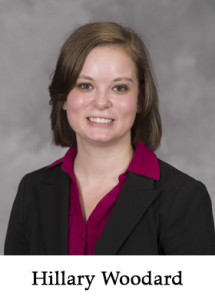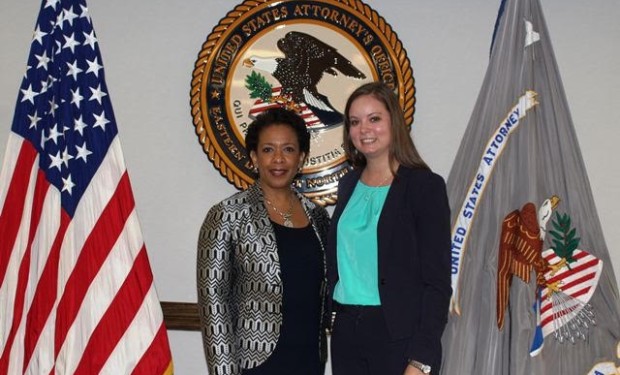Campbell Law School students excel in North Carolina and across the nation: United States Attorney’s Office
By Hillary Woodard, 3L at Campbell University School of Law
Editor’s Note: The Campbell Law Observer is taking a break from its usual editorial cycle to present first-person accounts from our law students who have enjoyed summer internships across the nation. This is the third of four submissions to be published during the Fall 2015 semester.
 At the beginning of the summer, I heard someone say that some defendants are sentenced to life in prison while others earn their ticket to life in prison one conviction at a time.
At the beginning of the summer, I heard someone say that some defendants are sentenced to life in prison while others earn their ticket to life in prison one conviction at a time.
I spent my summer externing at the United States Attorney’s Office (USAO) in Raleigh, and I was fortunate enough to be placed in the Organized Crime Drug Enforcement Task Force (OCDETF) unit. Not only did I have the chance to discover just how naïve I was regarding the prevalence of drugs and drug trafficking in our community, but I also discovered the fascination I have with crimes involving drugs (what exactly is an eight ball?). I reveled in researching criminal procedure issues regarding the constitutionality of searches and seizures while reading the Presentence Reports of cocaine and heroin addicts. Prepared by probation, Presentence Reports are one of the most useful compilations of information available when working on a case at the USAO. They contain almost everything you could possibly want to know about the defendant, from their prior convictions, charges, and record level, to their education, employment, and home life. Many times I would flip to the “personal” section of the PSRs because yes, their prior conviction level was important, but I wanted to know the whole story.
This was not like a law school hypothetical and at the end of the day my actions were going to impact an actual person.
As I was working on an assignment regarding the admissibility of handwriting comparison testimony, one of the Assistant United States Attorneys walked past my cubicle, mentioning that he had something I might want to work on. A few hours later, he walked by again, teasing me that I had been avoiding him. And in all reality, I had been fairly busy, but he was at least partially right; there was a reason I was dreading walking into his office. I knew he was not only going to give me the opportunity to work on something new and interesting, but he was going to push me outside my comfort zone and I was certain he would not take no for an answer.
Sitting across from him in his office, he asked me what I was doing the next day and if I could go with him to Greenville. I nodded my willingness, and he handed me a file, starting to explain the details of the case. A probation violation—he asked me to do the detention hearing. While I had done a few things in a couple other courthouses throughout the summer, a detention hearing was on my intern bucket list. He looked at me, asking if I felt comfortable doing this, and I made the mistake of telling him that I am the type of person who likes feeling completely prepared before I open my mouth in front of a judge. Smiling, the AUSA told me I could have the file for thirty minutes and then had to bring it back to his office, go home for the day, and not think about the case for the rest of the night. I walked back to my cubicle, flipping through the defendant’s file, trying to figure out how thirty minutes was going to be enough time for me to feel prepared. But as I flipped through the pages reading through the convictions, while it might sound petty or cliché, I realized that this defendant was a real person.
This was not like a law school hypothetical and at the end of the day my actions were going to impact an actual person. This defendant had few convictions compared to many of the other files I saw throughout the summer, but even still, the criminal record was not short. Only a few years older than me, with two children and a cocaine addiction, this defendant’s life looked radically different from mine and I realized just how easy it is to forget that these defendants are human beings. They have families who love them, and even though their rap sheets might be 15 pages long and every single conviction might be entirely their fault, still, they are human beings.
No longer were they criminals who needed the harshest punishment available; they were people.
For the remainder of the summer, my attitude towards defendants changed. No longer were they criminals who needed the harshest punishment available; they were people. During the summer, I also had the opportunity to research several cases to determine if defendants were entitled to a decreased sentence. I had a stack of letters from pro se defendants in jail and from represented defendants, but I distinctly remember one particular case in which the defendant was represented by the Federal Public Defender’s Office. It was clear that he had provided assistance that resulted in the successful prosecution of multiple defendants. My assigning AUSA agreed with my finding, and she allowed me to argue the motion for the defendant’s decreased sentence in front of Judge Flanagan. Despite having no idea what I was doing (and being slightly terrified), as I sat at counsel table after making my argument, I listened to the Assistant Federal Public Defender explain the progress that this defendant had made. He talked about how the defendant had taken classes, been involved with a substance abuse treatment program, and how he had a job and was working while in prison. And again, I realized, these defendants are more than just a name on a piece of paper.
But the experience that challenged my opinions regarding who in the field of criminal law each attorney impacts and who exactly it is that needs help, was when I heard a defendant’s confession during a sentencing hearing. Each judge always gives the defendants a chance to say something during their sentencing, and usually, it is a one-line, mumbled apology to the court and maybe a few family members. But this one was different. As he expressed his remorse to the court, he explained to the judge how he hated what he had done and how difficult it was when he was living on the street not to turn to a life of crime. He told the judge that when he was in prison, he had a routine, he had a plan, and he had a support group to guide him on the right path. With no family and a lengthy criminal record, I knew it was not something he could sustain upon release. He was earning his life sentence one conviction at a time.
I am thankful that perspective was challenged this summer, and I hope to never lose sight of the humanity and the impact attorneys have on actual lives.
Even today, I still find his situation to be frustrating. No matter how much we as attorneys work to help those involved with a crime, it is not a magic wand that automatically means the victim is going to be thankful the defendant is in prison, or that the defendant is never going to commit another a crime. But even though every situation might not end the way it seems like it should, it is for the victims that are thankful and the defendants who needed a second chance or to be reminded that they cannot commit crimes that remind me why I want to be a prosecutor.
I came to law school for the reason many other people did, because I wanted to help people. With an English and Dance degree, I was not quite sure what that looked like, but law school seemed like a good option. But somewhere along the way, in discovering what exactly I wanted to do and how I wanted to help people, without even realizing it, I started thinking that victims were the only people that needed and deserved help. I am thankful that perspective was challenged this summer, and I hope to never lose sight of the humanity and the impact attorneys have on actual lives.
Hillary Woodard is a 3L at Campbell University School of Law who will graduate in May 2016. She can be reached by email at hk***********@************ll.edu.






